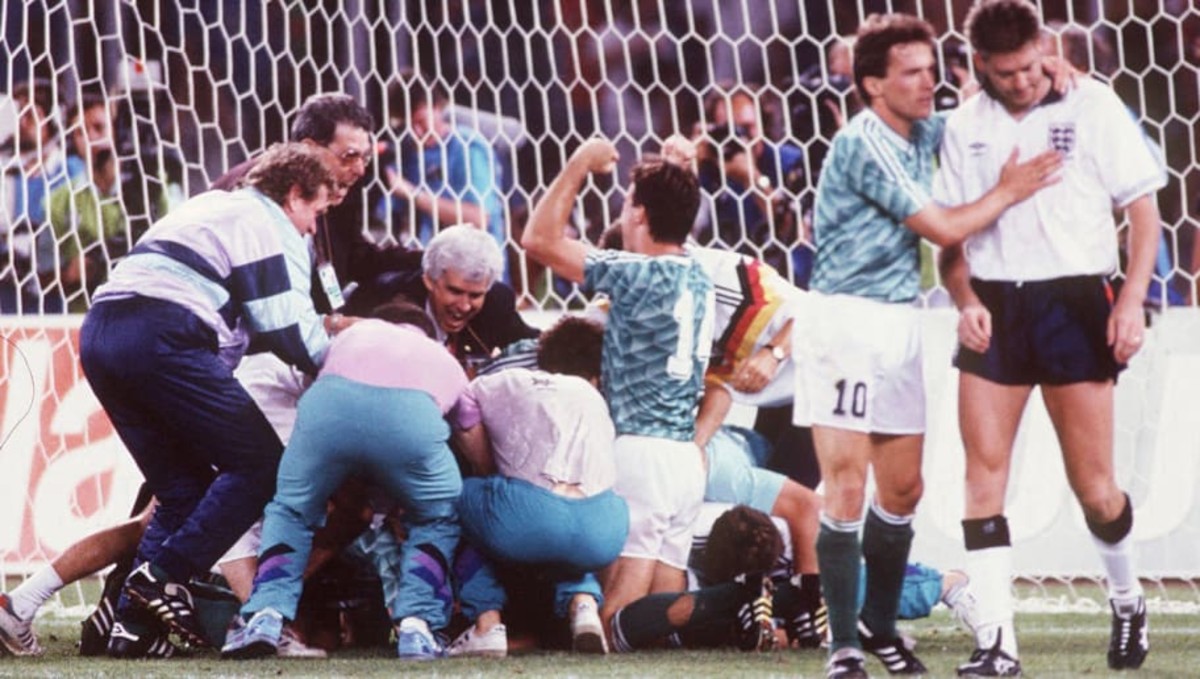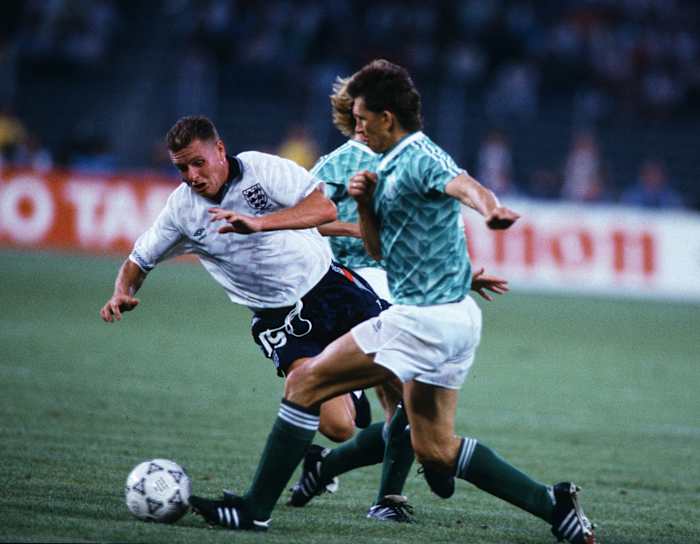World Cup Countdown: 7 Weeks to Go - Heartbreak For England After Semi Final Defeat to West Germany

A tournament that has produced little by way of success if you are of an English persuasion, the 1990 World Cup would prove to be England's most successful run in the competition since Bobby Moore lifted the Jules Rimet trophy way back in 1966.
Held in Italy for a second time after hosting 1934's edition, West Germany stood in the way of the Three Lions reaching their second World Cup final, with the reward of a game against Argentina for the winner an added incentive for both sides following the events in 1986.
In what was a game befitting of the occasion, the two old foes would produce an enthralling encounter during their tussle Turin which would ultimately end in tears for England, commencing their fraught relationship with World Cup penalty shootouts.
Managing England at a World Cup for a second time after reaching the quarter final in 1986, Sir Bobby Robson led a side many believed to be one of their most talented. Littered with attacking stars such as David Platt, Gary Lineker and Paul Gascoigne to name a few, while the defensive capabilities of the likes of Terry Butcher, Stuart Pearce and Peter Shilton made them a useful outfit.
Despite the players at their disposal, they somewhat stuttered through Group F, as a pair of draws against the Republic of Ireland and Euro 1988 winners the Netherlands preceded an underwhelming 1-0 win against Egypt to top their group. West Germany on the other hand made their intentions clear, topping Group D with emphatic wins against Yugoslavia and the United Arab Emirates before a 1-1 draw with Colombia.
The knockout stages for the Three Lions proved to be a far less tepid affair, as Platt's volley in the final minute of extra time saw them past Belgium in the last 16, before a quarter final exit looked on the cards with Cameroon leading 2-1 until Lineker's first penalty in the 83rd minute sent the game into extra time, while his second penalty in the 105th minute confirmed England's place in the semis.
West Germany, managed by Franz Beckenbauer, had a run to the semi final was nothing if not efficient. Overcoming Holland and Czechoslovakia in the last 16 and quarter finals respectively meant that England and Die Mannschaft would meet in the World Cup for the first time since 1982, with 4th July the date for what would be a true footballing spectacle in every sense of the word.
At the Stadio delle Alpi, Bobby Robson and his players knew the task in front of them trying to defeat a West Germany boasting the talents of, and not limited to, Rudi Voeller, Juergen Klinsmann and captain Lothar Matthaeus, with an importance for England to make a strong start.
They duly obliged, taking the game to West Germany from the offset with Gascoigne at the heart of everything positive for England, showing a creative ingenuity that the semi final of a World Cup warranted, although did well to go into half time level after a late rally from their opponents as Matthaeus began to have more of an influence on the game.
For as well as England had competed in the opening 45 minutes, they soon found themselves a goal behind 15 minutes after the restart. A free kick was laid off for Andreas Brehme to strike, which looped over a helpless Peter Shilton, after taking a wicked deflection off Paul Parker to break the deadlock.
It seemed to be one of those games in Turin for the Three Lions following the goal. Pearce had a great chance with a header that drifted agonisingly wide of Bodo Illgner's far post, while Chris Waddle was denied what appeared to be a blatant penalty after being tripped by Klaus Augenthaler.
Their endeavour however, would be rewarded with just under 10 minutes of the game remaining, courtesy of Lineker's fourth goal at the World Cup. A long ball from Parker caused confusion in the German defence as Juergen Kohler, Thomas Berthold and Augenthaler failed to clear the ball, which eventually fell to serial poacher to clinically dispatch the opportunity, sending the game into extra time.
The first period of additional play began with West Germany on the front foot but couldn't take advantage of their dominance. Klinsmann was the main culprit of wastefulness in front of goal, firstly denied brilliantly by an agile Shilton, before firing a volley just wide a minute later.
With the game now stretched and only five minutes of the half remaining, the defining image of the semi final would soon take place that managed to encapsulate not only the magnitude of the situation, but also the passion and frustration that came with it.
Gascoigne was one of a number of players on a yellow card prior to the semi final, with a second ruling any of them out of a potential final. That fate soon befell England's number 19, after a late lunge on Berthold after overrunning the ball left referee Jose Ramiz Wright with the cruel task of booking England's star of Italia '90, who produced a deluge of tears that would've been reciprocated by fans back home, as the realisation of missing a World Cup final became all too real.
Summed up best by the man himself, he said: "When I was a young kid playing at my youth club, every night I used to dream about playing football at the World Cup. I lived that dream in Italy. When I was shown the yellow card, I knew it had come to an end."
There was soon even more drama before the half concluded, as Waddle hit the post in the final few seconds with a first time effort, while Platt was the length of a stud away from converting the rebound.
Chances continued to come in the second period as everyone who viewed the game probably though how it was only still 1-1. Platt had a goal disallowed after being adjudged to be narrowly offside, while Beckenbauer's Germany could've won the game in the final two minutes but Guido Buchwald curled his 20 yard effort off the outside of the post, meaning the game had to be decided by way of penalties.
The very essence of sport means that there has to be a winner and a loser, with a penalty shootout a microcosm of this. It was to be England's first penalty shootout in the World Cup, while for the German's their third, winning the previous two.
The scores were level at 3-3 when Pearce stepped forward. So reliable from the spot for his club side, the full back's penalty was straight at Illgner which, after Olaf Thon converted meant Waddle had to score. He missed, firing over the bar and with that, England's World Cup came to the most heart-wrenching of conclusions in a semi final that neither side deserved to lose.
For West Germany, they would claim a third World Cup title in the final, exacting revenge for their defeat four years prior with a 1-0 win against Argentina, making Beckenbauer only the second man to win the World Cup as both a player and manager. England however would lose their third place play off against hosts Italy, but a fourth placed finish was, and still is, their best finish at the tournament since 1966.
While it would prove to be another World Cup where success would allude England by means of a trophy, Bobby Robson's side were heralded upon their arrival back home. By far and away his best finish in what would prove to be his final tournament with the national side, Robson had installed a sense of pride back into the England national team, creating stars throughout their Italian journey, with none shining brighter than the mercurial talent of Gascoigne.
There is no shame in losing to the eventual winners of the World Cup, especially in the manner it came about, which paved the way for Lineker's famous comments that still rings true today, stating: "Football is a simple game, 22 men chase a ball around for 90 minutes and in the end, the Germans win."







